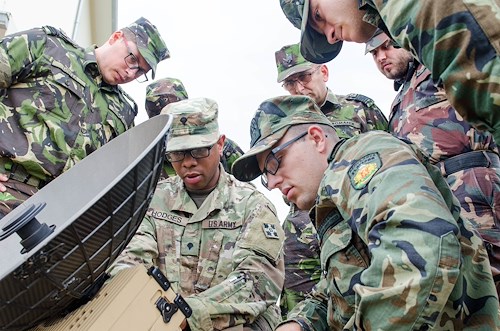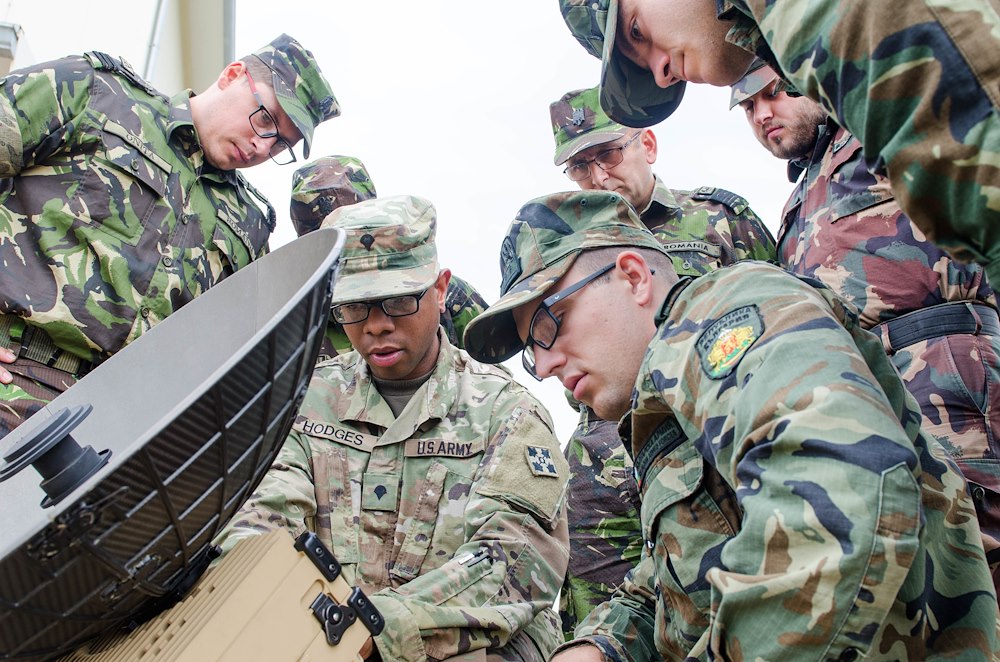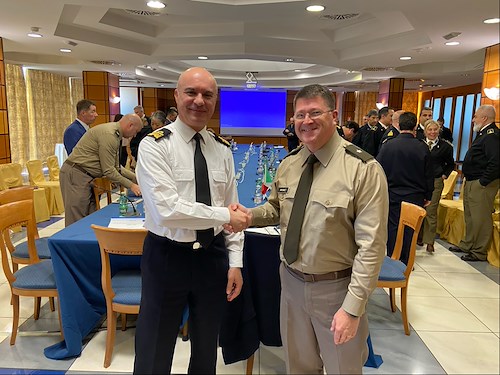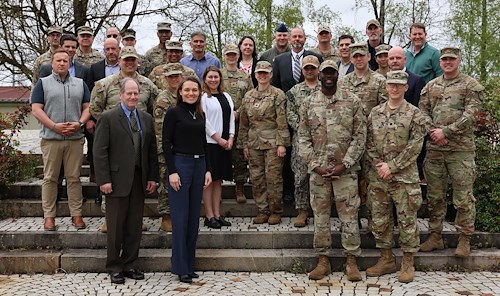Gallery contains 6 images
×
Photo 1 of 6
Saber Guardian 17 strengthens multinational force to create a Strong Europe
U.S. Army Spc. Tyrone Hodges, a radio operator with Headquarters and Headquarters Battalion, 4th Infantry Division, leads a satellite class for multinational service members from Bulgaria, Romania and Hungry at Novo Selo Training Area, Bulgaria on July 12. Hodges is one of 22 service members who built and maintain the command network for exercise Saber Guardian 17, a multinational exercise that spans across Bulgaria, Hungary and Romania with more than 25,000 service members and 22 allied and partner nations.
Photo by: Staff Sgt. Amy Elker
Photo 2 of 6
Saber Guardian 17 strengthens multinational force to create a Strong Europe
Bulgarian President Rumen Radev greets and thanks U.S. Army tankers with 3rd Brigade, 1st Battalion, 8th Infantry Regiment who participated in a combined arms live fire exercise July 20, 2017 at Novo Selo Training Area, Bulgaria during exercise Saber Guardian 17. Saber Guardian is a U.S. Army Europe-led, multinational exercise that spans across Bulgaria, Hungary and Romania with more than 25,000 service members from 22 allied and partner nations. (U.S. Army photo by Sgt. Tyler Meister)
Photo by: Staff Sgt. Amy Elker
Photo 3 of 6
Saber Guardian 17 strengthens multinational force to create a Strong Europe
A Romanian sailor provides covering fire for his fellow sailors who carry a rubber dinghy to conduct a river crossing exercise rehearsal during Saber Guardian 17 over the Danube River, Bordusani, Romania, July 15, 2017. Saber Guardian is a U.S. Army Europe-led multinational exercise that spans across Bulgaria, Hungary and Romania with more than 25,000 service members from 22 allied and partner nations. (U.S. Army photo by Staff Sgt. Timothy Villareal/Released)
Photo by: Staff Sgt. Amy Elker
Photo 4 of 6
Saber Guardian 17 strengthens multinational force to create a Strong Europe
U.S. Army soldier with 1st battalion, 8th infantry regiment, 3rd armored brigade combat team, 4th infantry division prepare to breech a room during urban operations training for the 2017 Saber Guardian Exercise at Koren, Bulgaria, July 15, 2017. Saber Guardian is a U.S. Army Europe-Led, multinational exercise that spans across Bulgaria, Hungary and Romania with more than 25,000 service members from 22 allied and partner nations. (U.S Army photo by SPC Winterlyn Patterson)
Photo by: Staff Sgt. Amy Elker
Photo 5 of 6
Saber Guardian 17 strengthens multinational force to create a Strong Europe
U.S. Army Cpt. Mark Buhl, left, commander, Company B, 1st Battalion, 8th Infantry Regiment, 3rd Armored Brigade Combat Team, 4th Infantry Division, Ft. Carson, Colorado, discusses the next plan of attack with his Soldiers during situational tactical training during exercise Saber Guardian 17 at Novo Selo Training Base, Bulgaria, July 15, 2017. Saber Guardian is a U.S. Army Europe-led, multinational exercise that spans across Bulgaria, Hungary and Romania with more than 25,000 service members from 22 allied and partner nations. (U.S. Army photo by Staff Sgt. Amy Elker)
Photo by: Staff Sgt. Amy Elker
Photo 6 of 6
Saber Guardian 17 strengthens multinational force to create a Strong Europe
U.S. Army Lt. Gen. Ben Hodges, commanding general of U.S. Army Europe, speaks with Serbian medical professionals with the Balkan Medical Task Force during mass casualty medical training July 16, 2017, at Mihail Kogalniceanu Air Base, Romania, as part of exercise Saber Guardian 17. Hodges instilled the importance and great impact our NATO allies have on enhancing training opportunities in order to develop a stronger Europe. Saber Guardian is a U.S. Army Europe-led, multinational exercise that spans across Bulgaria, Hungary and Romania with more than 25,000 service members from 22 allied and partner nations. (U.S. Army photo by Sgt. Tyler Meister)
Photo by: Staff Sgt. Amy Elker
NOVO SELO, Bulgaria (July 19, 2017) — Learning how to communicate and work effectively with an individual from another country would be a daunting task for many. Ramp that up to 25,000 people from 22 different nations working and communicating together in a high intensity situation to complete a common task on a massive scale, and you have Saber Guardian 17.
Saber Guardian is an annual, U.S. Army Europe-led, multinational exercise, which takes place during the month of July in numerous locations across Bulgaria, Hungary and Romania, and is co-hosted by the land force components in those countries. Saber Guardian is the largest in size and scope since its inception in 2013. Though it is not a NATO exercise, hosting nations are all NATO members.
Lt. Col. Georges Strachan-Heyes, from the United Kingdom, is with the British Army serving as an exchange officer with the 4th Infantry Division based in Fort Carson, Colorado, on a two-year assignment. During Saber Guardian Strachan-Heyes’ role is as the deputy chief of staff for the Multinational Division Saber Guardian as the lead action officer for plans and operations. In that role, he has been responsible for much of the concept of the exercise, which began its planning stages November 2016.
Saber Guardian features an air defense artillery live fire exercise, several field training and live fire exercises, multiple river crossings, airborne operations, air assault and a mass casualty exercise.
Strachan-Heyes explained the purpose of Saber Guardian is “for the various nations to come together to practice and rehearse how they would operate as an allied force.”
With the threat of potential conflicts in the European region increasing, Strachan-Heyes said the need for a strong, unified force ready to provide security and stability in the region is imperative.
“The exercise is important because of its sheer size — it demonstrates allied resolve, capability and credibility; seeks to inform and deter threats; and supports NATO’s intention to ensure all the allied nations provide security across the alliance in a very rapid manner,” he said.
The biggest outcome from the exercise, Strachan-Heyes explained, is “getting military personnel from lots of different nations, with different ways of learning to form a single team.” He said it reinforces the message that allies and partners are “pulling their weight” and not just following the lead of the U.S. Army.
“It’s a bigger, better approach,” he said.
Capt. Mark Buhl, commander, Company B, 1st Battalion, 8th Infantry Regiment, 3rd Armored Brigade Combat Team, 4th ID, shared a simplified explanation for the purpose behind Saber Guardian.
“Saber Guardian is the Army’s version of a scrimmage for a football game, where two teams oppose each other in an effort to get better,” he said.
Buhl echoed much of what Strachan-Heyes said regarding the biggest lessons he, and Soldiers in his company, have taken away thus far from the exercise.
“I think we are pretty close to achieving our best potential outcome,” he said. “At the end of the day, we are learning tactics and procedures from the Georgians, Bulgarians, Greeks and even other units within the U.S. Army to work together better, and have discovered the way we do things is not the way everybody else does things.”
Buhl led his company in situational tactical exercise lanes training at the Novo Selo Training Base in Bulgaria for exercise Eagle Sentinel 17 – one of 18 U.S. Army Europe allied and partner exercises in the Black Sea region, with Saber Guardian being the largest. While each exercise is separate and distinct, as a whole these exercises serve the same purpose, which is to convey a Strong Europe.
Maj. Michael Harrison, executive officer, 1st Bn., 8th Inf. Regt., 3rd ABCT, 4th ID, said this has been a “unique opportunity to improve our training readiness — a top priority alongside our partners and allies.” It also provides his battalion with the opportunity to train in Europe.
“For many of us, this is the first, and maybe only time, we will be able to do that,” he said.
A military exercise of this magnitude requires a significant amount of time, money and resources to execute; yet, Harrison believes building relationships with our allies and partners as well as continuing to improve the readiness of a multinational force far outweigh the cost.
“Saber Guardian assures our allies and partners of our commitment to NATO and to the security of Europe to deter aggression of any force that would threaten the values and institution we fight for,” he said. “The greatest lesson we can learn is we are much stronger when we fight as a united force, with our allies and partners, rather than as a unilateral actor.”























